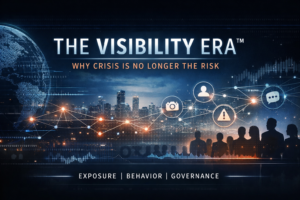January 27, 2026

-
April 1, 2025
What Is a Crisis, Really?
In today’s hyper-connected and unforgiving digital ecosystem, the definition of a crisis has evolved. It is no longer limited to large-scale corporate scandals or televised disasters. A modern crisis can be as subtle as an ambiguous LinkedIn post, a poorly timed internal email, or a public misstep captured on video and shared millions of times before the individual involved even has a chance to respond. The velocity of information and misinformation has turned reputation into a volatile asset.
At The Executor & Associates, we define a crisis as any threat to your identity, authority, or continuity that alters the perception of your name, your institution, or your legacy. This threat may be reputational, operational, psychological, or even existential. And it almost never begins in the headlines it begins quietly, internally, at the level of culture, communication, and decision-making.
The most common error organizations make is assuming that a crisis starts when the public finds out. In truth, most crises begin months before they are visible. They take shape in unmonitored online chatter, unattended client complaints, or tone-deaf brand messaging. By the time your name is trending, it’s not the beginning it’s the explosion.
That’s why crisis preparedness is not reactive; it is a proactive discipline. Leaders must begin to reframe the concept of crisis from “damage control” to “strategic defense.” This means implementing live scenario planning, narrative control strategies, real-time risk monitoring, executive media coaching, and vulnerability audits long before any issue surfaces.
Crisis is not always chaos. It can be the moment you demonstrate leadership, composure, and narrative command. But only if you are trained to do so. Only if you have a team already in place. And only if you view reputation not as an image to be polished, but as an asset to be protected like equity or capital.
The edge belongs to the informed.


